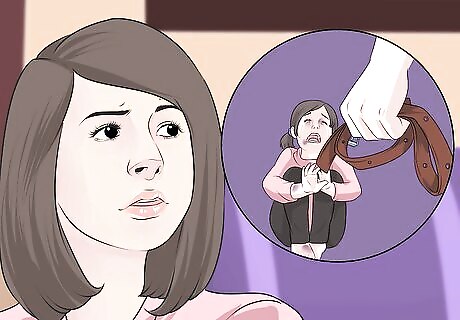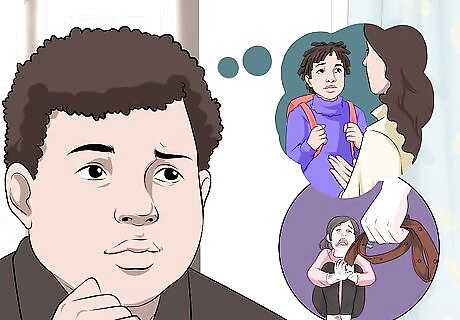
views
Talking with Your Parents

Listen to your parents. Listen to what your parents are scolding you about. Make sure that you truly understand why they are upset. Do not interrupt them or yell back, but show that you are listening to what they have to say. As you listen to your parents, make sure that you are giving them your full attention. Put away your phone or anything else that might distract you. Make eye contact with your parents and face towards them to show you are paying attention. Do not interrupt your parents. If they say something that confuses you, make a mental note of it and ask questions when they give you a chance to speak.

Stay as calm as possible. It is important to stay as calm as possible when your parents are scolding you. Otherwise, your parents may feel like you are being defiant. Try your best to avoid yelling, even if your parents are yelling. Instead, speak in a low, calm voice. This will show your parents that you are trying to have a serious discussion with them instead of just arguing with them. Try taking a few slow, deep breaths to calm yourself down before you start talking.

Seek to understand why your parents are scolding you. It would help you to know why you are being scolded. If that isn't clear to you, you should ask them to explain it. If you ask calmly and under control, they may also respond in a calm way. Try saying something like, “I am not totally sure about what I did to make you upset, but I would like to know. Can you please explain it to me so that I can try to correct the problem?”

Admit it if you have broken the rules. There is a good chance that you have some fault in the situation. Do not make excuses for any part you played, instead own up to it honestly. If own up to your mischief and make an effort to fix it, your parents are likely to be more pleasant to deal with. Try saying something like, “I know that I broke the rules. I will do what I can to make things right.”

Apologize for any wrongdoing. Aside from owning up to any mistake you may have made, it is also helpful to say that you are sorry. Express to your parents that you are sorry that you have broken the rules. Remember that a real apology also includes fixing the problem and making a serious effort not to repeat it. Try saying, “I am sorry for breaking the rules. I will do my best not to break the rules again.”

Tell them your side of the story. Your parents might not know your side of the story, so it is important to share it with them. Make sure that you give all of the details that are needed to understand why the event happened. This is not about making excuses, it is about making the case that you had a reason for your actions. For example, if you were out past your curfew because your best friend got a flat tire, then share this with your parents. You might even offer to call your friend so that she can confirm that what you say is true.

Ask to be excused for a few minutes. If the conversation does not seem to be going anywhere, then you might ask to be excused for a few minutes. Taking a five minute break in your room might be enough to help you collect your thoughts and calm yourself down. Try saying something like, “I want to talk about this, but I am feeling a little overwhelmed. Is it okay if I take a few minutes to myself?”
Accepting the Consequences

Expect that you might have consequences beyond the scolding. Sometimes parents feel that a good scolding is enough to get their point across. Other times they resort to longer lasting methods such as grounding. If you are being scolded for something that your parents take very seriously, keep in mind that there may be an additional punishment. For example, if you came home way past your normal curfew, then your parents might ground you for a week and also reduce your curfew to an earlier time.

React calmly to any consequences. Try not to get upset or complain about the consequences that your parents decide on. The angrier you get, the more likely you are to make things worse for yourself. Remember to take deep breaths if you feel like yelling or showing your anger in another way. If you truly think that the punishment is unfair, then try saying something like, “I understand that you want me to learn from this experience. However, this punishment will cause me to miss out on some of my best friend's birthday party. Is there any way that we can compromise so that I can still attend?”

Ask your parents how to handle similar situations in the future. Allowing your parents to discuss better choices with you will help tremendously. If they feel that you have made a bad choice, they will want to stop you from doing it again. The more receptive you are to talking it out and hearing their point of view, the less they feel the need to scold you. Try saying something like, “I want to make sure that this never happens again. What do you suggest that I do to avoid a similar situation?”
Recognizing Signs of Abuse

Do not make excuses for physical abuse. Physical abuse is not discipline. It is a way for a parent to assert their dominance over a child or teen and instill fear. This is usually done out of anger and frustration. You can recognize physical abuse easily because it is any physical contact (e.g., hitting, biting, pushing, etc.) that causes physical injury or pain. Keep in mind that certain physical punishments are not considered abuse. For example, some parents spank their children as a way to punish them.Did You Know? Some forms of physical punishment (such as repeated beatings with a belt) are now banned in most countries, although they were once used in extremely serious situations.

Know the difference between scolding and emotional abuse. Scolding is a form of discipline that can be used to verbally point out when a child does something wrong. This can be taken to an abusive extreme in some cases. Emotional abuse is present when a parent constantly belittles or shames a child. This impacts the child's self-esteem and can damage future relationships and create lasting psychological problems for the child. For example, it would be reasonable for your parents to scold you if you ran up a huge bill on your cell phone. However, it would not be appropriate for them to call you names or to accuse you of being the source of their financial problems.

Learn to identify sexual abuse. Sexual abuse is any sexual contact between a person under eighteen and a person over eighteen, or between a much younger child and much older child. If there is any sexual aspect to the “scolding” or “punishment” this is sexual abuse. You should seek help right away. For example, if your parent touches you in a way that makes you feel uncomfortable, then this might be considered sexual abuse.















Comments
0 comment